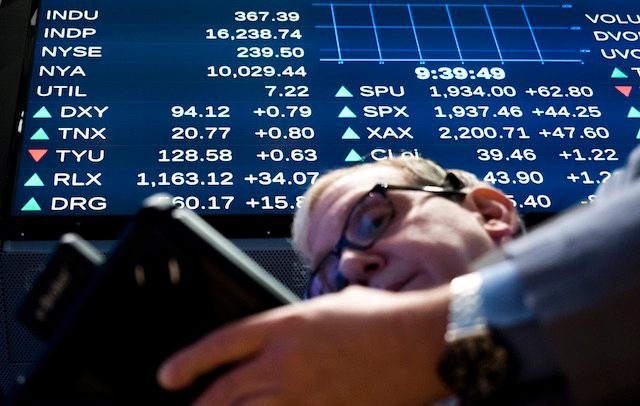SUMMARY
This is AI generated summarization, which may have errors. For context, always refer to the full article.

NEW YORK, USA – The global markets rebound fizzled out on Wall Street Tuesday, August 25, as investors locked in gains and took cover from more possible turmoil.
What appeared one hour before the close of New York trading as a solid comeback, after the global “Black Monday” onslaught of selling, turned into a sixth straight day of losses on US markets.
Investors across most of Asia, Europe and Latin America took encouragement from the Chinese central bank’s move to slash interest rates for the fifth time in nine months to shore up the world’s second-largest economy.
With the exception of Shanghai (-7.63%) and Tokyo (-3.96%), the gains were strong in major bourses.
Frankfurt and Paris closed up more than 4.0%, while London gained 3.09%.
Wall Street appeared on track for the same, trading up nearly 3.0% early in the session.
But selling took hold late, raising questions about the firmness of the wider rebound in equities, oil and some other commodities.
The S&P 500 ended down 1.35%, after Monday’s nearly 4.0% plunge. The Dow gave up 1.29%.
“Nerves are frayed after what happened yesterday,” said Bill Lynch of Hinsdale Associates
Monday’s (August 24) rout wiped about $2.7 trillion off global equity values in bourses from Sydney to London to Buenos Aires.
Tuesday opened with more worries, with Chinese and Japanese markets sinking. But the rate cut from the People’s Bank of China raised hopes that Beijing will do what is needed to stabilize the economy.
Even Hong Kong’s market, closely tied to China, managed a 0.72% gain.
French President Francois Hollande said he trusted that “Chinese authorities will overcome this stock market crisis.”
But the British finance minister, George Osborne, warned that the global economy could not be immune.
“These dramatic movements in recent days are telling us there are still lots of risks out there in the global economy and there are particular concerns about what’s going on in China… it means we’re not immune to what goes on in the world,” he said.
Fears still abound
For those closer to the markets, the question was also about the economic linkages.
“Monday’s sell-off may have been overdone but the underlying fears remain,” said Craig Erlam at trading firm Oanda.
“The Chinese economy is slowing and the more we see its markets collapse, the more concerned investors are going to become.”
“We have seen before that these large crashes can either spark or act as a warning of a global recession, and given how fragile many economies still are, it would be naive to think the same couldn’t happen again.”
Most vulnerable are emerging-market economies, which have seen a huge outflow of capital especially since Beijing took a surprise step to devalue the yuan against the dollar two weeks ago.
After slipping for a few days, the currency has been stable since then, but the worries the devaluations gave birth to – that leaders in Beijing are not fully on top of their problems – remain.
“What we are facing now is the increasing uncertainty over the ability of the Chinese authorities to manage the transition in China,” said Angel Ubide, an economist at the Peterson Institute for International Economics.
Chinese Premier Li Keqiang insisted Tuesday there was no basis for the yuan currency to weaken further and said the exchange rate would be maintained at a “basically stable” level, state media reported.
Analysts were still hopeful that the US economy and markets can hold up amid the turmoil.
“I think it will take a while for the market to heal because of the technical damage that was done,” said Lynch.
“It’s going to be volatile for sure, but I would hope that two or three months out, the market will have solidified and stabilized, and hopefully be higher than where it is today.” – John Biers, AFP / Rappler.com
Add a comment
How does this make you feel?
There are no comments yet. Add your comment to start the conversation.